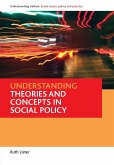Theories of Social Inequality provides an engaging, authoritative, and comprehensive introduction to the way in which theorists view the social construction of inequality. First grounding his discussion in the work of major classical theorists, such as Karl Marx, Max Weber, and Emile Durkheim, the author then considers more recent theories and theorists, including those of Ralf Dahrendorf, Gerhard Lenski, Nico Poulantzas, Erik Olin Wright, Frank Parkin, Anthony Giddens, and others. Professor Grabb also links theories of economic inequality to theories of racial and ethnic inequality, and considers the ways in which inequality has been affected by globalization. The connections among economic power, ideological power, and political power are also considered. As the author writes in the introduction, "In my view, our present circumstances and our likely future hinge in large measure on how we deal with social inequality. Indeed, I believe that the problem of social inequality is more important to understand and resolve now than at any time since the 1930s and 1940s." "Edward Grabb's authoritative examination of key theories of social inequality is a unique international classic. It provides an accessible introduction for new students and non-academics, while at the same time offering innovative analyses of key themes developed from classical to contemporary theory, a feature that repays reading and re-reading by scholars at the cutting edge of the field. Each important theorist is placed in political and ideological context, and the significance of unresolved empirical issues is identified. This book has the enduring capacity to inspire new understandings of social inequality so imperative in today's world." ---Jeffrey G. Reitz, Professor Emeritus of Sociology and R. F. Harney Professor Emeritus of Ethnic, Immigration, and Pluralism Studies, University of Toronto
Hinweis: Dieser Artikel kann nur an eine deutsche Lieferadresse ausgeliefert werden.
Hinweis: Dieser Artikel kann nur an eine deutsche Lieferadresse ausgeliefert werden.








